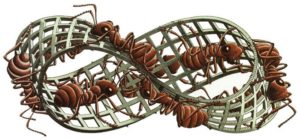Social evolution: cooperation and conflict between genes, individuals and groups
Natural selection explains the appearance of design in the living world. But at what level is this design expected to manifest – gene, individual or group – and what is its function? Social evolution provides a window on this problem, because it is in the context of social interaction that the interests of genes, individuals and groups come into conflict with each other.
I invite applications for a PhD studentship in my research group at the School of Biology, University of St Andrews, Scotland, to develop new theory on the topic of social evolution. The project will suit a Biology graduate with a strong interest in social evolution, but applications from graduates with other backgrounds are also encouraged, and although prior experience in mathematical modelling would be helpful this is certainly not required as the requisite training will be provided.
Current research in my lab involves development of general theory – using kin selection, multilevel selection, game theory and theoretical population genetics approaches – as well as more specific mathematical and computer simulation models that are tailored to the biology of particular organisms, from microbes to insects to humans. Much of our ongoing work is focused on intragenomic conflicts and associated clinical pathologies, plus the role of sex and gender in social evolution.
This studentship is funded by the European Research Council and the School of Biology at the University of St Andrews for a duration of 3.5 years. There are no nationality restrictions on who can apply, and the studentship will cover both Home and Overseas tuition fees, as well as providing a living allowance and covering the costs of the research. (Chinese nationals are particularly encouraged to apply, as they will also be eligible for additional funding opportunities at the University of St Andrews.)
If evolutionary biology really fascinates you, and you are a careful thinker, then you will flourish in the kind of project that I enjoy supervising. Please direct informal enquiries to Prof Andy Gardner ([email protected]).
The deadline for applications is 3 Dec 2021. Details on how to apply are given here.
